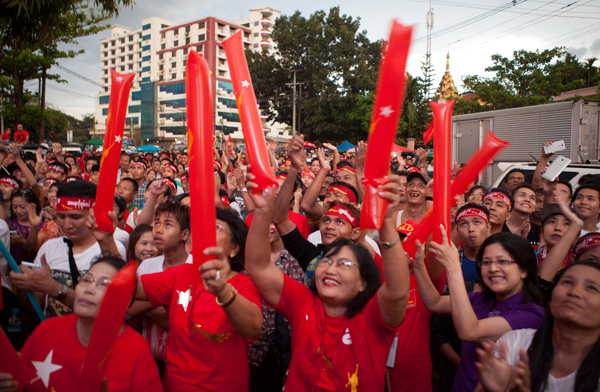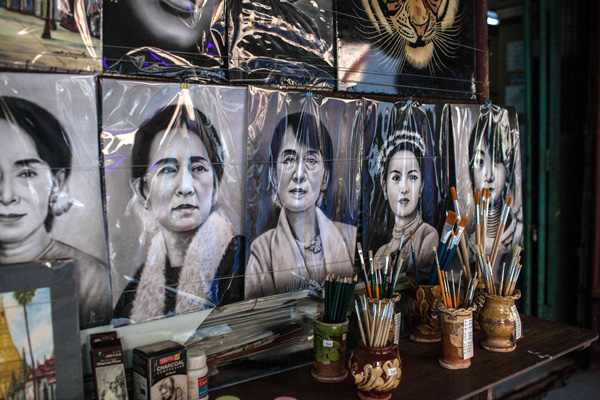Winning was easy. Suu Kyi's real test is making Myanmar truly democratic

The victory
- Suu Kyi\'s NLD has won a landslide poll victory in Myanmar
- Myanmar has been ruled by the military since 1962
- In 1990 too, NLD won the poll but the junta refused to hand over power
The challenge
- The military still retains effective control of the levers of power
- The military has a virtual a veto on constitutional changes
- Suu Kyi has failed the persecuted Rohingyas so far. Will she do better now?
More in the story
- How the military rulers paved the road to democracy
- Why Suu Kyi won\'t be president despite the landslide victory
Myanmar celebrates a historic victory today. In its freest election in 25 years, Aung San Suu Kyi's National League for Democracy has won more than 329 seats, gaining control of both houses of parliament, according to the electoral commission.
For a country ruled by a military junta since 1962, this is a breakthrough.
But in Myanmar, winning at the ballot fairly is crossing just the first hurdle.
Also read - Suu Kyi won hands down. But don't expect radical changes in Myanmar
As journalist Bertil Lintner told the Burmese media house The Irrawaddy recently, "There's so much at stake here. The international recognition and legitimacy, Myanmar's standing in the international community. I think that the government wants this day to be as open, free and transparent as possible. They can't really risk it by cheating."
According to Lintner, the real test for Myanmar now is how it deals with the poll result after all the celebrations and announcing to the world that it's now free and democratic.
Yet, even as the people of Myanmar celebrate, a turbulent history has taught them that democracy cannot be taken for granted. It's hard won, one battle at a time.
Democracy with limits

Photo: Stephen J Boitano/LightRocket/Getty Images
The road to democracy began, ironically, with the military's unveiling of the 7-step road map to "disciplined democracy" in 2003.
Military ruler Gen Khin Nyunt promised to draft a new constitution, put it to a national referendum, hold free and fair elections, and finally build a "modern, developed, democratic nation by elected state leaders".
In 2008, the junta, led by Senior Gen Than Shwe, crafted a new constitution. It, however, ensured that the military's dominance would continue, albeit behind a thin veil of democracy.
The junta's "disciplined democracy" essentially meant the military would retain the reins of power. Indeed, the draft constitution makes it almost impossible for Suu Kyi's NLD to initiate the reforms necessary to bring change.
Here is a reckoner on the constitutional hurdles that Suu Kyi faces today:
- Article 436 permanently reserves for the military 25% seats in both houses of the national parliament and a third of all seats in state parliaments.
- Constitutional amendments require over 75% of the vote in the parliament, which means the military, with its mandated 25% presence, effectively has a veto over any proposed changes.
- There is no effective separation of powers among the executive, parliament, judiciary and armed forces. Most state powers are either vested in the president or subject to his influence or direction, or given to the chief of the armed forces.
- The 2008 constitution provides a framework for what amounts to a separate regime for the armed forces, giving its members special privileges and representation in state institutions as well as widespread immunities.
- Even when Thein Sein, a former general, took over as president of a new "civilian" administration in 2011, the military retained control over conflict management, internal security, border affairs and military matters. It also kept hold of the overarching National Defense and Security Council, which is composed of the president and select officials and has the power to declare emergency, disband parliament and rule directly.
- The constitution mandates that a party must win a two-thirds majority, or 329 seats, in parliament to be able to elect a president.
- Suu Kyi has crossed this mark, but she still won't be president. According to the constitution, the president cannot have children who submit to a "foreign power". Suu Kyi has two children from her late husband Michael Aris and both are both British nationals. This means she can never become president until a constitutional amendment takes place.
Myanmar has been ruled continuously by a military junta since the coup in 1962
On her shoulders

Photo: Lauren DeCicca/Getty Images
In a country where widespread human rights violations have invited sanctions from the West, a big part of ensuring democracy works and flourishes rests on Suu Kyi's shoulders.
She has already drawn criticism for turning a blind eye to the oppression of the country's Rohingya Muslim minority. The community wasn't even allowed to vote in the election and Suu Kyi has brushed aside their concerns as an "exaggeration".
Besides Rohingyas, Myanmar has several ethnic minorities that don't yet have representation in the government. It's to be seen how Suu Kyi will take everybody along on the bumpy road to democratic reforms.
"It shouldn't be forgotten that the military still wields significant power. It still maintains a quarter of all parliamentary seats and controls key ministries, particularly home affairs and military. A key test for the NLD will be how it manages its relationship with the military," Oliver Slow, a reporter with The Frontier, an English magazine based in Yangon, told Catch in an email interview.
Ghosts of the past
On 27 May 1990, Myanmar had similarly celebrated the landslide victory of the NLD in a "free and fair" election held by the junta. Two months later, however, the military rulers announced that they could not hand over power to one party while keeping many others out. Other interests needed to be taken into consideration as well, they argued.
"I remember the disappointment and the anger that people felt. But somehow they got away with it. I don't think they will be that crude this time. That wouldn't work in this day and age. With mobile phones, Facebook, social media, the country is much more open now than it was in 1990," said Lintner.
"The Burmese are fans of social media and get most of their news from it. Facebook has exploded in Myanmar since mobile phones became accessible last year. A SIM card that cost $300 earlier now comes for just $1.50," said Slow.
In 2003, military ruler Gen Khin Nyunt unveiled a 7-step roadmap to 'disciplined democracy'
"This election is largely seen to have been credible. Despite there being concerns of a coup in the past, that is looking less and less likely as the government makes the right noises about handing over power peacefully."
These "noises" include President U Thein Sein's 11 November letter to the NLD congratulating the party on it's "victory" and promising to respect the "decision of the voters".
He also vowed to hand over power at "the right time in accordance with the decision of the voters".
A new beginning
"If I wanted a job, I could have gone anywhere. Travel, lifestyle, comfort, stability - all could have happened easier elsewhere. I came to Myanmar believing that these years will go down in my life as the 'I was there!' years," Rahul Batra, 31, wrote on Facebook, alongside a video of a visibly enthused flag-waving crowd outside the NLD office. Batra is a Tech Entrepreneur who moved from Bangalore to Yangon in May 2013 and later set up an information access venture with a couple of Burmese entrepreneurs in early 2014..
"NLD has promised legal reforms and better governance. For start-ups like mine that have had to pump in quite a bit of setting up costs and invest a lot of time in lengthy bureaucratic procedures to be up and running, the new government promises a transparent environment," Batra told Catch over the phone.
But the people of Myanmar are more patient. As So Pyay Win, 29, from Yangon puts it, "I don't see a big change right away. It will take a long time. We have had a lot of restrictions. We expect more freedom, more rights, and with that, over time, change."
READ MORE - #MyanmarElections: Aung San Suu Kyi's party wins all 12 of the first seats declared against USDP
Welcoming Asia's youngest democracy: more about Aung San Suu Kyi's struggle for a democratic Myanmar
First published: 13 November 2015, 19:16 IST






![BJP's Kapil Mishra recreates Shankar Mahadevan’s ‘Breathless’ song to highlight Delhi pollution [WATCH] BJP's Kapil Mishra recreates Shankar Mahadevan’s ‘Breathless’ song to highlight Delhi pollution [WATCH]](https://images.catchnews.com/upload/2022/11/03/kapil-mishra_240884_300x172.png)

![Anupam Kher shares pictures of his toned body on 67th birthday [MUST SEE] Anupam Kher shares pictures of his toned body on 67th birthday [MUST SEE]](https://images.catchnews.com/upload/2022/03/07/Anupam_kher_231145_300x172.jpg)



_in_Assams_Dibrugarh_(Photo_257977_1600x1200.jpg)


